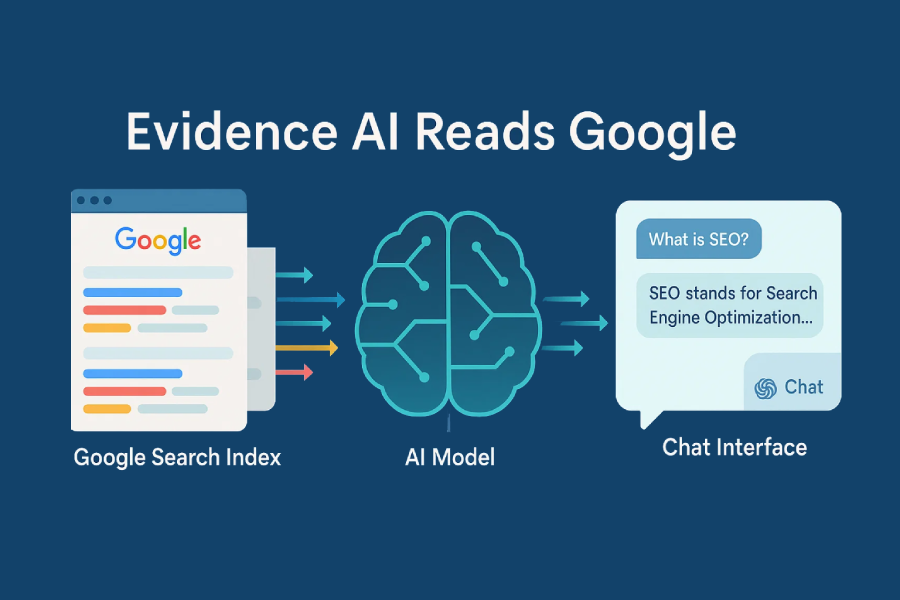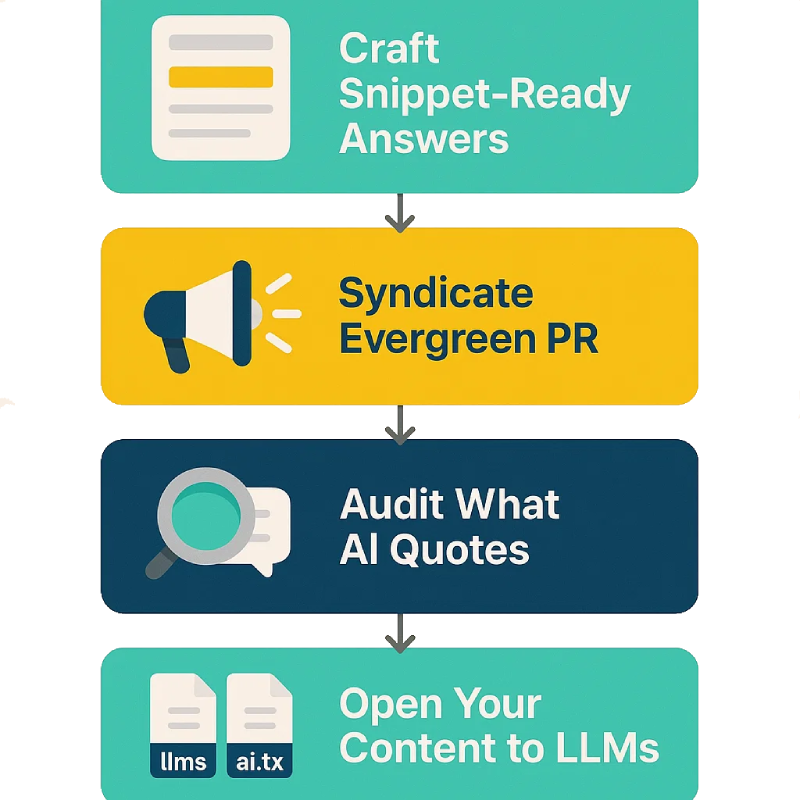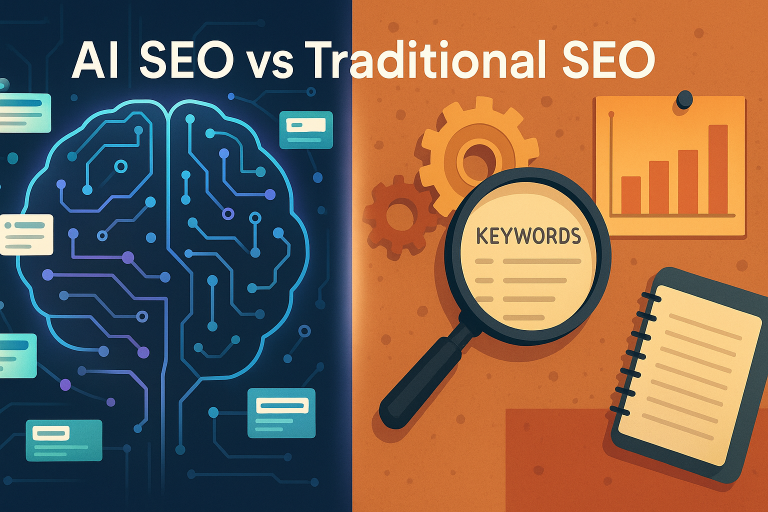What Really Works for SEO in 2025?
AI SEO has become one of the most misunderstood trends in digital marketing. The rise of AI-generated answers has created a wave of confusion (and opportunity) in SEO. While many self-declared “AI SEO experts” argue we need entirely new strategies, the latest evidence shows something surprising: optimizing for Google still drives visibility in AI tools like ChatGPT.
In fact, new experiments suggest OpenAI may be quietly using Google's search index to inform ChatGPT responses. If true, this flips the AI SEO narrative: to win in AI search, you double down on traditional best practices.
Strategic Context: Why AI SEO Matters Now
Search behavior is evolving fast. Users are increasingly turning to AI platforms (ChatGPT, Gemini, Perplexity) for answers instead of clicking through organic links. That shift is threatening to bypass traditional SERPs entirely, especially for question-based queries.
This has opened the door for “AI SEO” services promising to optimize specifically for generative engines. But without clear standards or confirmed mechanics behind LLM indexing, much of that advice is speculative at best (and deceptive at worst).
Edward Sturm’s recent podcast cuts through this noise by running controlled SEO experiments and reviewing real-world results from well-known industry figures. What emerges is a clearer picture of what AI is really doing with web content (and how marketers can stay ahead).
Key Insights from the Experiments

ChatGPT Is Likely Indexing Google SERPs
Abhishek Iyer coined a nonsense term, published it on a page indexed only by Google (not Bing or OpenAI), and then asked ChatGPT about it. The model responded with content from the page: suggesting it had accessed Google’s index directly or indirectly.
Aleyda Solis ran a similar test. Her content appeared in ChatGPT only after Google indexed it. The content was quoted nearly verbatim, matching the Google search snippet.
Takeaway: If Google sees it, there’s a good chance ChatGPT does too.
Sources:
AI SEO Tactics Often Mirror Old PR Tricks
One actually-new tactic is using cheap press release syndication to flood low-authority newswires. AI engines often pull summaries from those distributed articles (even if they wouldn’t rank in traditional SERPs).
Why? Because AI tools don't (yet) weigh domain authority the way search engines do. They aggregate across mentions. That means distributed repetition can be just as influential as centralized authority in AI summaries. Example: A $15 press release uploaded to dozens of syndication sites gets quoted in ChatGPT as if it's fact.
Google Is Still the Gold Standard
Despite the hype, Google remains the most reliable proxy for how content will perform in AI platforms. The underlying structure of AI-generated answers closely mirrors Google’s Featured Snippets and Knowledge Panels.
Gemini, Perplexity, Claude, and ChatGPT all reference similar sources. What shows up in Google often echoes across these systems.
What Most Marketers Miss
The loudest voices in “AI SEO” are selling novelty, not strategy. The biggest mistake marketers make right now? Chasing AI-specific hacks while ignoring the root system: search engine visibility.
Pattern recognition tells us that most generative platforms aren’t replacing Google: they’re repackaging it. If your content isn’t in Google's top results, it’s unlikely to be in an AI answer either.
AI SEO is just traditional SEO with new endpoints. Also, unlike Google, AI platforms are easily “fooled” by distributed messaging. If you’re not proactively shaping what’s being said about your brand across the open web, someone else will (and AI will reflect it).
Recommendations
If you're serious about ranking in both traditional and AI-driven searches, here's what to do next:
- Double Down on Featured Snippets—Write succinct, well-structured answers near the top of your pages. Use schema markup (FAQPage, HowTo, Article) to reinforce meaning. This increases your chances of being quoted in both Google and AI answers.
- Distribute Strategic Press Releases—Write authoritative, evergreen PR content (not news). Syndicate across multiple domains using Fiverr, SEOClerks, or PRWeb. Target informational phrases users might query in AI tools. ⚠️ Avoid low-quality filler; even AI systems are starting to down-rank spammy content.
- Monitor Snippet Copying—Search your own key terms in ChatGPT and Gemini. See what gets quoted. Often, AI tools reveal what they consider “canonical.”
- Use llms.txt and ai.txt Files—Signal AI engines that your content is accessible and usable for training. Explicitly grant permissions and point to licensing terms, FAQs, and JSON-LD schema.
- Track Mentions Across Low-Authority Domains—Use tools like Ahrefs or Brand24 to spot your brand in low-ranking news or blog syndications.

Final Word
The best SEO strategies today aren’t divided into “AI” & “traditional”. They’re integrated. The biggest unlock is understanding that most AI models are copycats. They reflect what’s already visible. If your content is clear, repeated, and indexed in Google, it’s already in the AI bloodstream. The smartest thing you can do? Stop chasing hacks. Start owning the narrative.
Schedule a FREE, no-obligation meeting to see if we can help.
Ai SEO vs Traditional SEO FAQs:
How do I use AI for SEO?
AI accelerates keyword research, content drafting, SERP analysis, and snippet optimization. Use it to enhance—not replace—strategic planning.
What elements are foundational for SEO with AI?
High-quality content, crawlability, and authority remain core. AI adds natural-language understanding, so clear structure and intent alignment are crucial.
How is AI overview affecting SEO for blogging?
AI Overviews (e.g., Google Gemini) pull concise answers directly from blog content. Clear headings, FAQs, and bolded summaries make your posts easier for AI to quote.
How AI overview will change SEO?
Overviews shift success from clicks to citations. Winning content is trusted enough for AI to quote—optimize featured snippets and structured markup.
What is AI SEO vs traditional SEO?
Traditional SEO aims to rank pages in SERPs. AI SEO focuses on being the authoritative source generative engines pull from; both share foundational tactics.
How many SEOs are using AI to write content?
Will AI take over SEO?
AI will transform workflows but not replace human strategy. The winners combine human creativity, ethics, and AI-powered efficiency.

